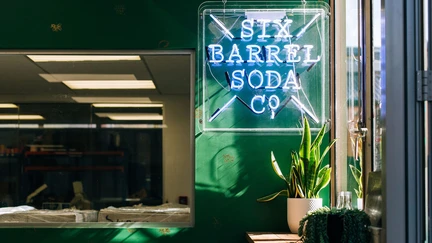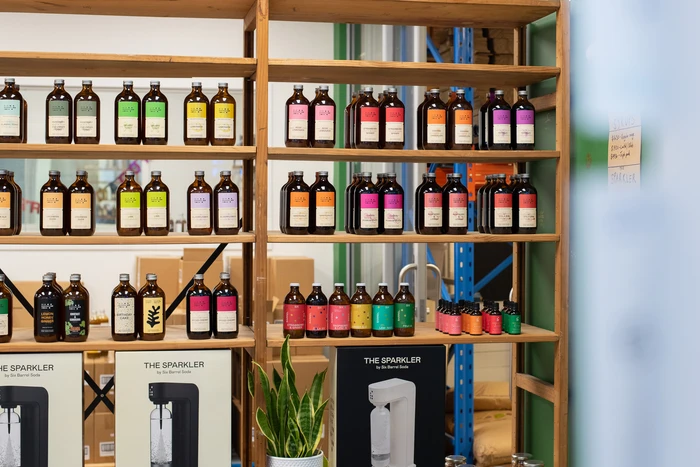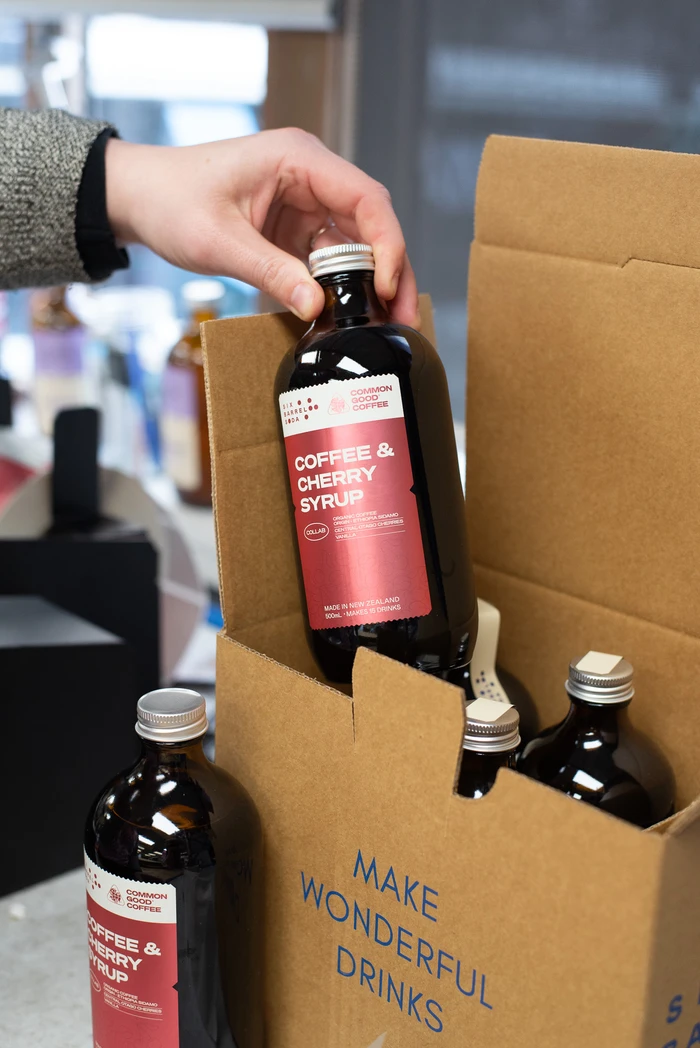Spotlight on Six Barrel Soda: Interview
Our Business Specialist librarian interviews small Wellington businesses. Today we are happy to have Six Barrel Soda.

Innovative, award winning and a firm Wellington favourite, Six Barrel Soda has been creating tasty sodas and soda syrups for over a decade. We ask how they do it.
Twelve years ago, when working in bars and finding it difficult to source quality cocktail mixes, Joe Slater and Mike Stewart set out to make their own.
From those initial experiments came what is now an iconic part of the Wellington beverage scene - Six Barrel Soda
Over the years their backstory has been covered in different mediums. Readers can learn about it by listening to Joe's interview with Jehan Casinader in the podcast Imagine This.
Fast forward more than a decade and Six Barrel Soda is winning awards for its innovative products and developing an international market.
WCL recently sat down with Six Barrel Soda General Manager Amy Alexander to chat about continuing to sustain innovation and growth, and supporting the Wellington community as the company progresses into their second decade.
WCL: Your products – the soda syrups, seltz drops and ready to drink soda - are made from real ingredients, locally sourced where possible. Why is that important?
Amy: The use of real ingredients is one of the many things that sets us apart from some of the more commercial syrups on the market. We are passionate about using real fruit from New Zealand growers, because not only is that supporting local business, but we are able to keep that income going directly to businesses here in New Zealand. It tastes delicious, and by keeping our supply chains local where we can we reduce emissions.
There are some things we can’t get in New Zealand. Sugar for example. This is fair trade organic cane sugar which comes from a co-operative in Paraguay.
WCL: Have you always deliberately showcased uniquely New Zealand flavours, or has that developed with time? By this I mean the incorporation of ingredients like mānuka and kawakawa?
Amy: We love showcasing what we have here in our backyard.
I know when Joe and Mike founded the business, the craft quality was very important to them. Part of the reason they started Six Barrel Soda was because there were craft producers of wine and beer, but there really weren't any small authentic artisan producers of soda at the time.
WCL: Grapefruit and jalapeño, orange and dandelion, coffee and cherry, these are not flavour pairings one would naturally think of. After more than ten years, where do you draw inspiration from in order to be innovative with flavours?
Amy: There are currently 17 flavours in our core range, and then we produce some special limited editions.
Personally, I love trying new things. I’m obsessed with food and beverage. I get a lot of inspiration from eating out and from visiting different countries. I love finding rare ingredients, exploring flavour combinations that aren’t necessary obvious or the norm here in New Zealand.
I have an amazing team. Cahalan, our production coordinator, understands flavours really well. We will have a brainstorming session and decide, “Right, what are we going to do for our experimentals this year?” We bank these ideas away and we create sample batches and see if they translate from paper to bottle.
WCL: Can you talk us through the process of developing a new product – how do you test what will work (or not), and how much lead in does it take before a finished product hits the shelves?
Amy: We have a subscription service where each month subscribers receive a monthly experimental syrup. That experimental syrup might be completely out the gate, or it could be something that's a little more everyone's cup of tea. With our monthly experimentals, we can be a little wilder as it's something fun and only in small numbers.
From a developmental point of view, if it was for an experimental - and we only sell these online and via cellar door - we will come up with a concept, make a trial batch in small numbers, and check it for things like stability and flavour development. If all of that comes together, then we can have that out in a couple of weeks usually.
If we are looking at a longer term, retail ready product, that can be a longer process. There’s a lot of background work that goes on. Product development is probably the easiest aspect. Getting it shelf ready takes time; there's design, print, and of course a sales and marketing plan. Depending on time of year, three months would be an average lead time.
For our recent coffee and cherry collaboration with Common Good coffee, we began that conversation a year ago. Cahalan started with three different coffees and designed it around them. Each coffee had a hero note– one was toasty and vanilla, one was chocolatey, and the other was fruit driven. We thought the fruit driven Ethiopian Single Origin coffee with the addition of Central Otago cherry was the best, a far more interesting combination.

Image courtesy of Six Barrel Soda
WCL: Do you recycle popular past flavours for a limited time?
Amy: Absolutely. On occasion we might bring an old favourite out as a monthly experimental. Last month we did kola nut, which was our original kola recipe, as we had a lot of people requesting this make an appearance again. Usually once a year we bring back a classic flavour as one of our monthly syrups. These are only available through our monthly subscription service or through the cellar door.
WCL: Your products are award winning, most recently your Yuzu and Mandarin Seltz drops took the title of Champion Drink for 2024 at the Outstanding NZ Food Producer Awards.
What does that mean to you as business when an award like this is bestowed, and is there a noticeable increase in sales afterwards?
Amy: We’re really proud of that award! To still be winning innovation and quality awards after being in business for 12+ years is super cool! We have a great team and products and to be recognised by the judges against all the hungry up and comers is very humbling.
I think it’s wonderful to be celebrated as an artisan in New Zealand. When you’re just starting a business, you can look to those more mature businesses and think “Right, if they’re still doing the mahi 12 years on, then we can keep at it”. We are so lucky to have so many incredible food and drink producers here. I could go on for hours about how we punch above our weight as a country in this space.
From a sales point of view, we definitely saw an uplift after the award. There is some great external and internal marketing around these awards and it's really beneficial. If you win something like this, be proud and celebrate - it takes the entire team!
WCL: Is the market more competitive than it was when Six Barrel first launched?
Amy: Definitely. The craft soda game has changed over the years with many more on the market. Consumers are more educated and keen to understand what they are buying and who they are buying from. We have different product categories. There are soda syrups, ready to drink bottled sodas and our seltz drops, meaning we have something for everyone.
WCL: Has the trend towards sober curiosity/reduced alcohol consumption boosted sales noticeably?
Amy: Consumers are most definitely looking for a more sophisticated non-alcoholic cocktail/mocktail option these days. Personally, I’ve cut down on drinking alcohol, so I am always looking for something a bit more enticing than an OJ and big brand soda. I think it's a real missed opportunity to not have craft local options available.

Image courtesy of Six Barrel Soda
WCL: Is the Sparkler soda maker manufactured to Six Barrel design? Is it made in NZ?
Amy: We work closely with our manufacturers in China for our sparklers. They share a similar goal in reducing single use plastic, while offering quality in the home appliance space. We share our ideas, and they bring them to life. They work with some of the world's leading soda machines, and the options are endless!
WCL: Moving on to the business – are the co-founders, Joe and Mike, still actively involved with the business these days?
Amy: Yes, they are still involved, not in the day-to-day sense, but absolutely there for anything we need as a team.
Joe and Mike are the co-founders/owners, with Chris joining them in 2020. Joe was the Managing Director for over ten years and is now our Brand Director. Mike is our Financial Director and Chris is our Commercial Director.
WCL: How many staff do you have here?
Amy: Five including myself. A small, but mighty team!
WCL: After 12 years growing a business, what does it take to keep moving forward?
Amy: Grit and the ability to adapt! There’s no easy answer. I think it takes a solid foundation, a great team and product, in our case. Hard work is included in all of that. I think it takes long term goal setting and strategic planning.
It takes stepping back sometimes to see the full picture and not getting caught in the day to day. Networking is invaluable - sharing war stories, sharing success stories and very careful financial management, especially in these times.
WCL: What keeps Six Barrel based in Wellington?
Amy: We’ve remained in Wellington because this is our iconic home. We have a great space here; we love this city and the vibrancy of it. Wellington has a special supportive community here for food and beverage and we’re grateful to be a part of it.
WCL: Over the years the company has developed an export market including Australia, Japan, Hong Kong, and Kuwait. Why these markets and how easy has it been to break into them?
Amy: Not easy, and why those markets? Australia feels like the next natural step for many kiwi businesses.
We were approached by contacts in Hong Kong, Japan and Kuwait - often keen to showcase the quality of our products and they loved the brand. Once tasted, these importers knew they had found something special.
Our export journey hasn’t been easy, we lost some traction due to covid and very delayed shipping times. We’re starting to build that business back up now which is exciting.
We know this year is going to be tricky for many businesses, so we are keen to nurture those overseas relationships, while continuing to cement our spot here in New Zealand.
WCL: What, if any, are the challenges of running an export business from Wellington?
Amy: We haven’t encountered anything major yet. We’ve got a great team, external contractors and freight partners who help bring us to the world.
WCL: What methods of marketing do you use and is it the same across all countries? Do you tend towards social media, billboards, print etc?
Amy: We usually leave that to our customers in that particular market. We don’t manage their marketing, but we are happy to share ideas and assets. The world is heavily digital now, but they know best how their customers want to engage.
WCL: A Mailchimp analytical piece in 2022 looked at return on investment for each email campaign you did and came up with a figure of NZ$1400+. This seems a good response to email campaigns.
Amy: We have a great response rate, leading to a really great uptake. I think it’s down to a few things. The people we are contacting are already Six Barrel Soda fans and have purchased from us previously. They’re engaged with what we do and genuinely like our product and brand.
We also only send emails when there’s something to talk about. We’re sending things based on people’s previous shopping habits; based on awards; based on new products and events we’re holding that our database will be interested in. We try to keep it short and snappy and use use a lot of visual cues.
We have a great, really engaged community who we are so grateful for!
WCL: You expanded into the Auckland market as Covid took over the world and during Covid you launched the US website as well. How did you fare overall during this time?
Amy: Covid was tough. There was a lot of unknowns, some supply chain disruption, shipping and freight delays, social distancing in a small work space, and of course the general uncertainty. I wasn’t with Six Barrel during covid, but I did have my own business and I know these concerns were shared.
The US the team had made some headway with a distributor over there, and they were in here [the production site] social distancing really not knowing how we were going to operate. Stock was produced, pallets were packed, and everything was rushed to the boat. But like everything during that time, shipping was delayed, and we missed that particular opportunity.
From a local market perspective, we saw a drop in our hospitality wholesale as so many places had to close, but we did see a rise in e-commerce and we were quick to put focus into this.
The Auckland soda shop – that was the worst timing you could imagine. It was such a wonderful project and I really think it would have taken off. It could have been a hero for our brand in another major city. Looking back, if we’d known a pandemic was looming we probably wouldn’t have opened a soda shop! Hindsight’s amazing.
Covid wasn’t good for us, but it made us more agile. It made us improve our online presence dramatically and we learned a lot from a production and logistics point of view.
WCL: In Joe’s podcast interview he said “It’s ok to fail”. Is part of an innovative culture allowing failure?
Amy: 100 percent. Sometimes you fail, but making mistakes is part of the process. If you don’t make mistakes, I don’t think you will ever grow. You have to be prepared to take risks of some description; you have to be prepared to make some messy mistakes.
You have to be prepared to think outside the box, if you really want to establish yourself and continue to be a brand that is innovative. I don’t think failure should be viewed as a negative thing, it should be viewed as having courage and the guts to try something.
I think having that vulnerability as a business is important. If you’ve done something and learned from it, that’s the key.
WCL: Issues like sustainability and paying a living wage are part of your kaupapa, along with social outreach projects and collaborations and sponsorship of local events. Why is being a good employer and supporting community initiatives important for Six Barrel Soda?
Amy: Breaking it down – things like sponsorship of CubaDupa – if we’re going to stay in this city and we want Wellington to remain this great, creative, fun place to live, we have to engage and support community events. CubaDupa for us, is a wonderful opportunity to showcase the creatives; the arts, performance and music – so many of the great things Wellington has to offer.
As to providing a living wage - we want to attract people who respect the place where they work and the mahi we all do. We want to work with people who feel valued. We want to be able to bounce ideas around, know that staff feel safe and included in this space.
We want to pay our team to not just be able to pay their rent but to be able to enjoy a little bit of life. Our team and their wellbeing are important to us. We don’t want people to come and feel like it’s just another day on the grind.
We have a monthly potluck shared lunch, team celebrations, lots of laughs, the never-ending lolly jar and we genuinely all like spending time together.
We work with multiple charity partners including Zealandia, Everybody Eats, The Kindness Collective and InsideOut - working together is the best way forward and when you share similar values, it's a no brainer.
WCL: Where to in the future?
Amy: For the immediate future - there is a lot of doom and gloom out there right now, but I do think we need to keep looking ahead. Although careful planning is required, we can’t get stuck. We will continue to focus on growth here and overseas, have focus and stay true to our values. We need to ensure we remain innovative and agile while supporting our team.
WCL would like to thank Amy and Six Barrel Soda for their time with this interview.
Want to know more about the soft drink and soda industry or how to make amazing drinks at home? Have a look at these items from our collection.
- Make your own soda : syrup recipes for all-natural pop, floats, cocktails, and more by Nocito, Anton
- Mocktails, cordials, syrups, infusions and more : over 80 delicious recipes for alcohol-free drinks
- The aerated water and soft drink industry in New Zealand, 1845-1986 by Robson, Peter E. W
- Capital thirst : Wellington's soft drink industry 1843-1988by Fisher Peter